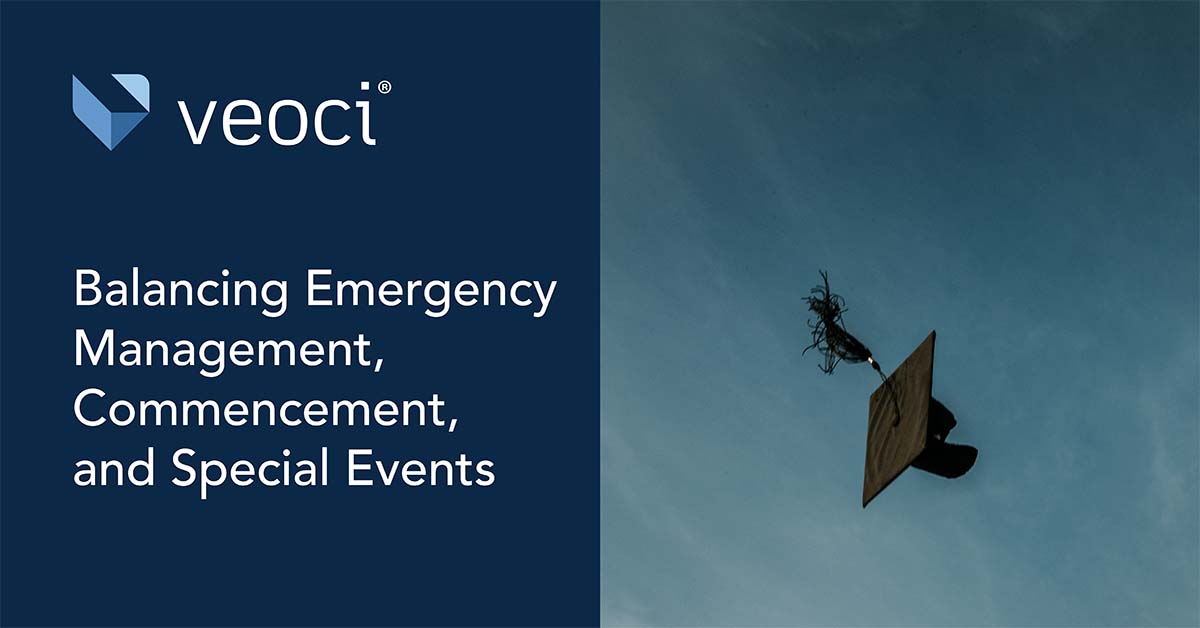Colleges and universities are choosing to host in person commencements for the class of 2022 after going virtual for the last two years. And some institutions are also hosting late graduations for the class of 2020.
These events are extremely important to graduates and families, but they present a unique set of challenges to the institutions hosting the events. What can colleges and universities do to ensure that these events run smoothly, and what challenges do they need to be on alert for?
Commencement: Behind the Scenes
Commencements and special events require a great deal of advance planning in order to run without incident.
Planning committees communicate via email for months leading up to the event, collaborating on agendas, coordinating speakers, and figuring out locations and transportation needs. Many schools also have to secure housing for a population that no longer lives on campus to accommodate the delayed celebrations for the class of 2020.
Commencements have many moving parts and different teams on campus need to be notified of their roles and responsibilities. Some universities may also need to plan multiple smaller ceremonies in order to have safe social distancing and other Covid-19 protocols, creating more scheduling challenges.
On the day of commencement, any established plans are subject to change. Weather is a question mark until a week before the event, and inclement conditions may force the ceremony to relocate. Possible medical emergencies, changes in agenda, and parking or population control difficulties are other major factors. Volunteers and other event staff at the ceremony also need to be clued in on plan modifications.
The Commencement Emergency Management Checklist
While many challenges come up when planning and managing commencements and special events, there are best practices that universities can implement to cut down any worries.
Clear Communication
Clear communication dispels confusion before and after an event. Often communication is conducted via email, where important information can become lost or overlooked. Digital platforms like Veoci offer a way to organize and streamline communication, so all personnel are aware of their tasks leading up to the big day. The cockpit feature is a single location for all discussion, where users can segment different topics into threads, and the most important messages can be pinned to the top of the page. On the day of the event, all information can be stored and accessed from a volunteer dashboard, with things like backup plans, check-in locations, and task lists available with a click of a button.
Expect all emergencies
Large gatherings like commencements increase the likelihood of emergency-like events. Planners shouldn’t be pessimistic, but rather have plans for handling all incidents, from a weather event to a medical emergency, in place. These plans and policies should be accessible to the appropriate parties leading up to and during the event. Programs that are available on phones and from the field are extremely helpful to event staff, who will be dealing with any emergency that arises and may need to check on emergency resources and policies.
Maintain Total Situational Awareness
An institution should build situational awareness within its community, ensuring they know the day of the event and its possibilities. This should extend into the event; all staff need to stay up to date on any changes in agenda or community needs, so they are able to respond accordingly. This is also true on a larger scale; universities need to be aware of what is going on in the world and in their local communities. On every level planners must maintain a common operating picture that adapts to changes on the day of the event.
Another Year in the Books
Commencement ceremonies look controlled on the outside, and that image keeps the internal planning out of sight. Emergency managers in higher education are an essential element in making everything look smooth on a very important day for many people. Special considerations and tools can ease the burden these emergency managers shoulder and help keep everyone safe and happy during a once-in-a-lifetime event.








